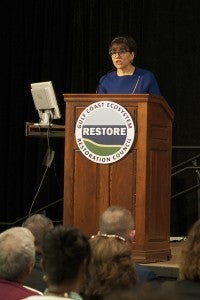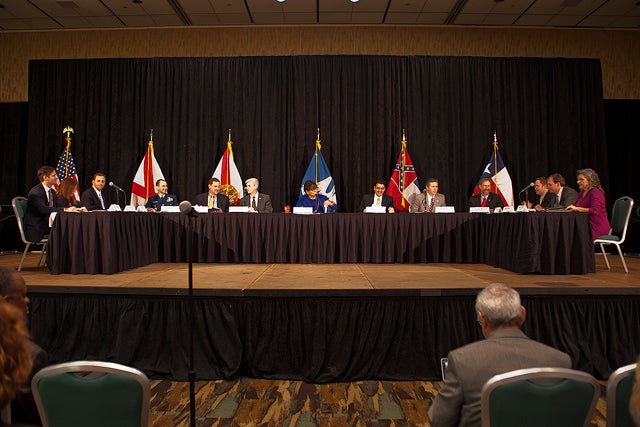$52.2 million in oil spill funds approved for Louisiana coastal restoration

Penny Pritzker, Secretary of Commerce and Chair of the RESTORE Council. Dec. 9, 2015. Credit: Robert Smith/Wildlife Mississippi
Last week, the Gulf Coast Ecosystem Restoration (RESTORE) Council approved its first Funded Priorities List (FPL) of projects and programs to fund with civil penalties available from the Deepwater Horizon oil spill Transocean settlement. This is an important step forward for the entire Gulf Coast that is still recovering from the spill. In particular for the Mississippi River Delta, the FPL demonstrates both the state of Louisiana’s commitment to funding Coastal Master Plan projects with RESTORE dollars and progress in implementing the master plan.
Louisiana submitted five project proposals, all of which are projects from the Coastal Master Plan. While these projects are still in planning phases, they represent critical near-term opportunities to keep the Mississippi River Delta on its path to recovery and sustainability. The Louisiana master plan projects receiving funding include:
- Golden Triangle Marsh Creation Project ($4.3 million; planning)
- Mississippi River Reintroduction into Maurepas Swamp Project ($14.2 million; planning)
- Biloxi Marsh Living Shoreline Project ($3.2 million; planning)
- West Grand Terre Beach Nourishment and Stabilization Project ($7.3 million; planning)
- Lowermost Mississippi River Management Program ($9.3 million; planning)
Two additional projects, Jean Lafitte Canal Backfilling ($8.7 million; implementation) and Bayou Dularge Ridge, Marsh and Hydrologic Restoration ($5.2 million; planning), are also located in Louisiana and were included in the Council’s FPL. These two projects, submitted for funding by federal members of the RESTORE Council, are complementary to and consistent with the Coastal Master Plan and will directly benefit coastal Louisiana.

The RESTORE Council meeting in Biloxi, Miss. Dec. 9, 2015. Credit: Robert Smith/Wildlife Mississippi
The finalization of this FPL comes in follow-up to positive progress made through other Gulf oil spill funding streams – the National Fish and Wildlife Gulf Environmental Benefit Fund, created by criminal plea agreements with multiple responsible parties, and the Natural Resource Damage Assessment and Restoration (NRDA) process.
Now that BP’s settlement of civil penalties and responsibilities under NRDA is pending, both the RESTORE Council and the NRDA Trustee Council will be able to make even more progress, with an eye toward large-scale restoration. For the RESTORE Council, the next step will be an update to its Initial Comprehensive Plan to improve decision-making, project selection, and to consider the projects planned and funded through the other oil spill funding streams. For the NRDA Trustees, their next step will be considering public comments and finalizing the draft Programmatic Damage Assessment and Restoration Plan.